Rating: 5/5
I think everyone has heard of this book. It is a very prestigious and well admired book and even if there are some harsh critics it’s indisputable that the story, with its 1st edition published in 1949, was revolutionary, ahead of its time and succeeded in making a very complete and deep political criticism that still stands today. I’ll be dividing this review in 2 parts: a synopsis of the book, my thoughts and an analysis on what and why this book still criticizes today.
For those skeptical of reading this review/article because they’ve already read a bunch of those about this book, I’ll leave you with a quote:
“The best books, he perceived, are those that tell you what you know already”
1984, George Orwell
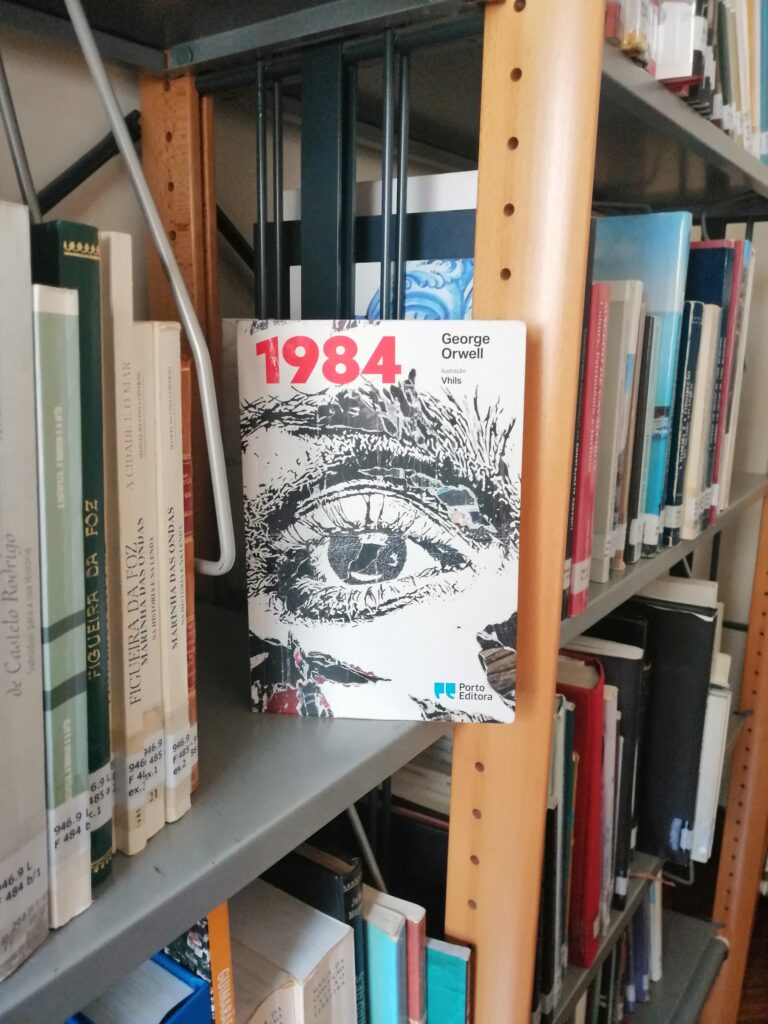
PART I: Synopsis
Winston Smith has a pretty monotone and boring life in Airstrip One (previously London) in the superstate of Oceania, ruled by the philosophy of INGSOC, a thought theory that agreed that all thoughts had to be collective. Winston explains it:
“The sacred principles of Ingsoc. Newspeak, doublethink, the mutability of the past”
1984, George Orwell
Just like the rest of the working class, he worked for the Party, more specifically in the Ministry of Truth. His job, ironically enough, was to alter documents of any kind to go according to the Party’s propaganda. Winston is given a piece of bread every day, smoked “Victory cigarettes”, and drank “Victory gin” and at the end of his work shift went home, not to a wife and kids but to an enormous picture of Big Brother, the omnipresent leader of the Party, and to a “telescreen” that covered every individual room, never fully shut its volume and spaying his every move. But still Winston is able to commit a crime.
The most serious crime didn’t start physically, it started on one’s mind. “Thoughtcrime”, in the official language of Oceania “Newspeak”, meant (obviously) the crime of thinking, but not any kind of thought, but the thought of bringing down Big Brother and the Party. Containing other crimes, this crime didn’t need a physical manifestation and was controlled by the Thought Police. Upon ones arrest, that happen for certain (it could take days or years but all criminals were arrested) the person would be “Vaporized”.
Winston describes it:
“People simply disappeared, always during the night. Your name was removed from the
registers, every record of everything you had ever done was wiped out, your one-time
existence was denied and then forgotten.”
- 1984, George Orwell
When Winston is secretly approached by Julia, they start to engage in sexual relations as a means of protest. Together, they decide to meet with O’Brien and join the Brotherhood (a group of people that are against Big brother and the Party). Things seem fine at first, however, suddenly, everything they build falls apart, landing Winston in the infamous Room 101.
PART II: Review (with spoilers)
I have so many thoughts and so many emotions on this book!! So, I will divide this review in three parts: The Characters, The Overall Review, and The Conclusion.
THE CHARACTERS
Winston
I suffered so much with what I consider to be a simple character!! George Orwell does such a good job at describing the felling of being the only one awake when everyone is sleeping and the hope of finally finding someone that is also awake.
Even though Winston wasn’t a lovable character I really liked being inside his head for this book. Not that I didn’t like him, he was just simple, and actually I think it worked better than he being over the top and super vocal about his ideals. His simpleness made him more relatable and allowed the reader to put himself into Winston shoes.
The way we see this character identity, personal believes and even REALITY disappear because of all the constant brain washing and torture is really heartbreaking. We see him trying to see the things like the government wanted, not being able, and getting tortured for it. And when we finally thought he had given up everything, there comes room 101, when he loses his humanity: the love for Julia – and finally becomes another Puppet.
Julia
I wished I got a little more out of this character. I feel like she was made to rotate around Winston and besides the first part, that she stated she was just having sex with members of the working class to go against the oppression, she didn’t seem to have any purpose outside her relationship with Winston. Even her joining the Brotherhood, I got the sentiment that she just did it for him.
Many people argue that her character is overall misogynistic, wish I agree partly. I don’t mind the where she views sex with the working class to be a form of revelation, since the woman isn’t supposed to be seen as a sex and attractive symbol, and workers for th Party aren’t supposed to engage, as the government goes as far as not permit any type of marriage between members if they see that they are physically attracted to each other.
However, where I have a problem is when, outside of that, she doesn’t have any strong
motives, reflecting on the common narratives women are often subjective to: just body,
no brains.
“Oh, but this book is from 1949, times were different” – The First Wave of feminism
occurred in the 19 th century, I’ll just leave it at that.
And, since we are on the theme, she could have other motives, besides body liberation,
without the story changing much. So, even though I don’t mind it much is just, why?
O’Brien
The characteristics of this mysterious character, in my opinion, are more a product of Winston’s imagination than anything else. Winston saw this man as a comfort place, and though he only talked with O’Brien once, the main character was trusting him even it he was the enemy:
“Winston had never been able to feel sure—even after this morning’s flash of the eyes it was still impossible to be sure whether O’Brien was a friend or an enemy. Nor did it even seem to matter greatly. There was a link of understanding between them, more important than affection or partisanship. ‘We shall meet in the place where there is no darkness,’ he had said. Winston did not know what it meant, only that in some way or another it would come true.”
- 1984, George Orwell
(Let’s ignore the foreshadowing of the quote or I’ll cry ahm)
Well, he turned out to be the enemy and I was so shocked ngl, this part had me gagged.
But it was more at the end of the book that we really start to see this character: Faking being part of the Brotherhood, making people sign fake contracts saying they would inflict pain upon kids and do everything against Big Brother and the Party, just to shove that in their faces later, when they asked for mercy from his tortures. Is in this final stage that we see truly the man behind all the suffering and brain washing.
We see, through Winston’s eyes that he, even after all the torture, as really deep affection to O’Brien and never comes to hate him. The relationship between him and Winston in the third part of the book really remind me of an abusive relationship. Not just because of the affection of Winston besides the abuse, but also because of the way O’Brien switches between being very calm and very violent on their interviews. Overall, they’re scenes together are very painful to read. We truly see a man lose his colors and mind at the end.
The Parsons family
This group of characters serves the purpose of representing the family life in the world of 1984. We see a father, stuck in his glory days as a spy, a mom worried about her and her families’ future and unable to control her kids, and the product of the Party: the Parsons children.
Through the couple’s actions we see that overall, they fear the young generation. By Mrs. Parsons we sense an uncomfortable tone when she mentions her kids to Winston and when she is around them, we see her constantly at ease.
On other hand, Mr. Parsons seems more vocal about how proud he is of their kids and how he thinks they are making great progress towards working for the Party. Nonetheless, he is later reported by his own kids for thoughtcrime, because he was saying “Down with Big Brother” in his sleep. So, in my opinion, the over confidence could have also been a defense mechanism of the fear he was feeling.
These toddlers learn to trust absolutely no one, not even their families. Disconnecting the bond of parents and their kids makes it easier for them to turn on their father and mother.
THE OVERALL REVIEW
The world of 1984 is truly a nightmare, from a mixture of fascism and communism (I know this sounds weird, but that’s the feeling I got). The conditions of peoples lives, the constant war, the slogan, I don’t even know where to start when talking about this.
Big Brother is the figure representative of the Party. He is the supreme leader ruling over all Oceania, he is perfect, getting the predictions right all of the time, never making a mistake and always making the best decisions for the superstate. However, no one has seen him in real life. He only appears as frightening a enormous poster on places in the state. Although O’Brien confirms his existence, I was still not sure if he was just a made-up authority figure so the message of the Party would be clearer and without the obstacles of a group.
“At one end of it a colored poster, too large for indoor display, had been tacked to the wall. It depicted simply an enormous face, more than a meter wide: the face of a man of about forty-five, with a heavy black moustache and ruggedly handsome features.”
- 1984, George Orwell
However, I do not believe that Big Brother existed. I believe, however, that he was a product of doublethink. If everyone believed he existed, he existed.
“The keyword here is BLACKWHITE. (…) Applied to a Party member, it means a loyal willingness to say that black is white when Party discipline demands this. But it means also the ability to BELIEVE that black is white, and more, to KNOW that black is white, and to forget that one has ever believed the contrary. This demands a continuous alteration of the past, made possible by the system of thought which really embraces all the rest, and which is known in Newspeak as DOUBLETHINK.”
- 1984, George Orwell
THE SLOGAN AND INGSOC
“WAR IS PEACE
FREEDOM IS SLAVERY
IGNORANCE IS STRENGTH”
- 1984, George Orwell
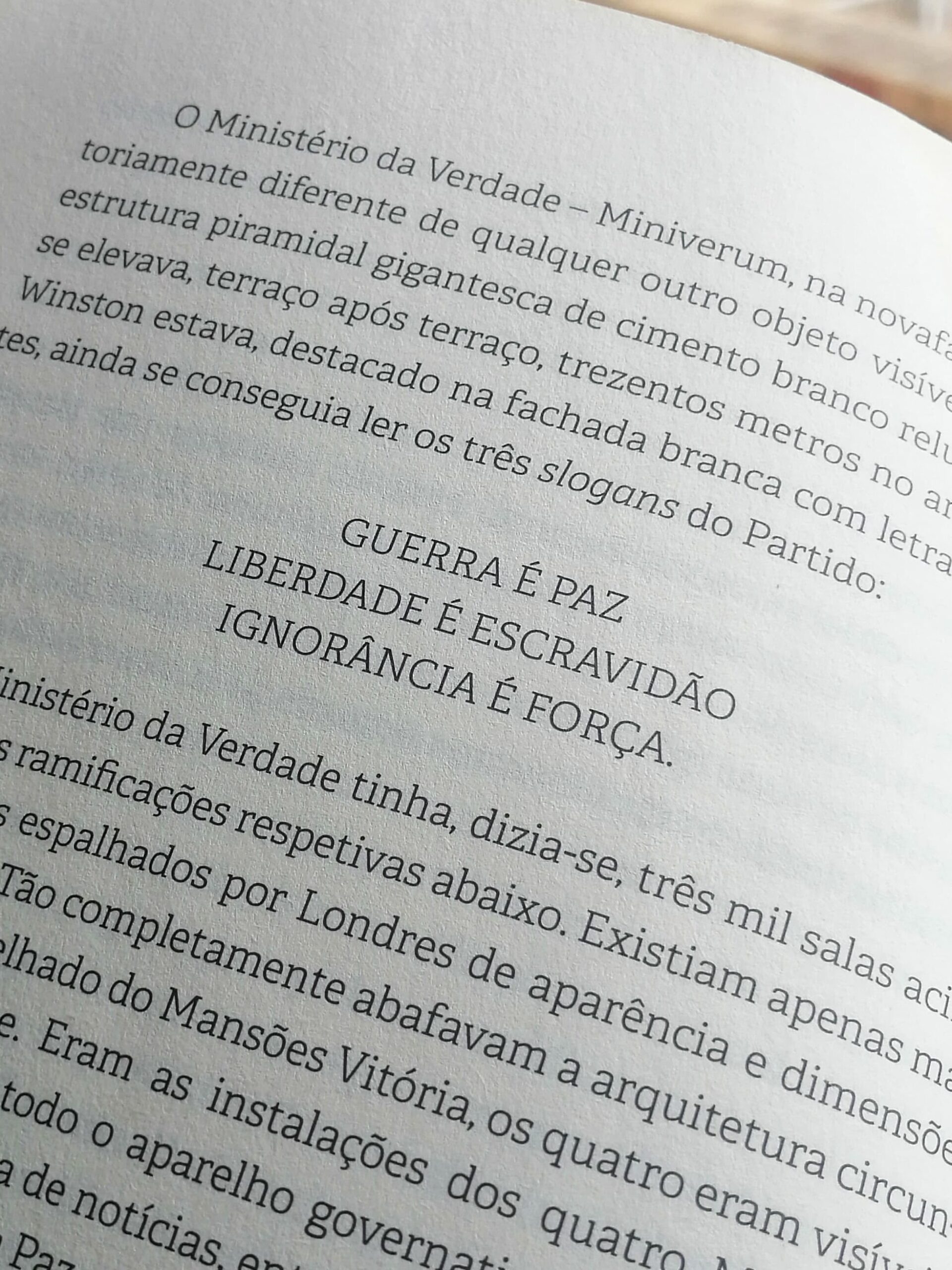
This slogan didn’t make sense for me for most of the book. I caught the concepts really early on, except this, I guess it was because I didn’t really understand the concept of “blackwhite” until the very end. After that I really started understanding why they are contradictions. I really liked the explanation aka “THE BOOK” but if I was going to talk about this, this review would be way longer than what already is. Then, remembering the parts of the book “THE THEORY AND PRACTICE OF OLIGARCHICAL COLLECTIVISM”, it was much easier to grasp it and understand the concept much better. In the end it is really fascinating in an awful way.
Talking about “THE BOOK” also known as “THE THEORY AND PRACTICE OF OLIGARCHICAL COLLECTIVISM”, just to get this of the way, I appreciated some parts (the explanation of the things that weren’t told by the story, like the slogans) and absolutely despise others (where I felt I was reading the same thing twice). It was to much and I feel like I already knew the parts that Goldstein’s book kept emphasizing aka the war with Eurasia/Eastasia. I really appreciate the smart aspect on how it contributed for the power and collectivism aspect but it went on for to long in my opinion.
In the end I’m glad Winston liked the read but I wish he would at finished it sooner then. After, he returns the read with Julia and the HE STOPS WHEN THEY WERE GOING TO TELL THE ONLY ONES CAPABLE OF CHANGING EVERYTHING, wish we find out later that Winston gets right, it’s the proles.
Even after reading some things a second time, I still don’t see how that would happen, the proles are almost uneducated, and not as affect by the oppression of the Party. Yes, they are probably a part of the population that is most affected by the constant war, but on the other hand, they don’t seem interested in it, since there is no mention of them being or wanting to be at the conventions of the Hate Week.
Speaking of hate, the Two Minutes Hate is literally such a nice detail (for the narrative people, not real life, chill) to this difunctional society that only an author like George Orwell could have thought about it.
But let’s focus now on INGSOC, as said earlier the main pillars are “Newspeak, Doublethink, The Mutability of the Past”
“Newspeak” is such a mind-blowing concept (at least for me, but hey). To think that for people to not be able to have their own thoughts a more simple and reduced language had to be created is truly a concept out of this world (not so much now lol but we’ll talk about that in a second). Syme, one of the developers of the newest edition of the language, and one of Winston’s friend, gets vaporized because he, according to Winston was too smart, and the Party doesn’t like people like that; and that’s a moment that really makes you think about the power and control of this oppressing society, where even the ones helping are still a threat.
The “Mutability of the Past” is basically Winston’s job. Everyday, he is stuck in a cube erasing old historical and current data that is not going side by side with the Party’s propaganda. He even has to imagine some of the data at some-point (and that’s also why I don’t believe Big Brother was ever real). This is a concept that I fear less, because now we have the internet, and everything in this age is dated and documented, but the fact that in the end, Winston really believes that the photo (it was a photo of three man that, after the photo was taken were vaporized – this photo compromised the Party’s agenda) that he saw was just a dream is really heartbreaking.
“Doublethink” – This is the most important act, in my point of view. As it was for Winston, for us, the act of being able to live with two realities but excepting only the collective one as the true one, is one that we can’t grasp. This really had me confused at first and I still need to think a bit deep to talk about this. But the doublethink is really reflected on the interviews that O’Brien did to Winston, when he tortures him to confess and to make him believe and make him see that 2+2 is 5.
It is also mentioned that laws don’t quite exist and if thy existed it would be against
INGSOC, and, with everything we know, I think that is truly the scariest thing.
Another thing is, although I liked the foreshadowing done often in the book (for example when Winston recalls a time where he had a dream wish O’Brien appeared 7 years before, and 7 years after Winston was betrayed by O’Brien and the said the same thing that Winston had dreamed of), I didn’t like when they did it with the rats in room 101.
I didn’t mention until now but for me this twist was just so silly. Walk with me through this. A man just confesses everything, he even starts seeing 5 fingers instead of 4 in a hand, he as been tortured, humiliated and undignified a many many times, and what makes him give in the only thing that he got (he even mentions this), his love for Julia, is his fear of rats? I also do not like rats but I feel like he was so dramatic about it. Not just that but with it being mentioned on the back of the book (the one that I own at least) I expected the room 101 to be something way bigger that the tortures and no I don’t think rats would have been worst that the torture Winston already had went through.
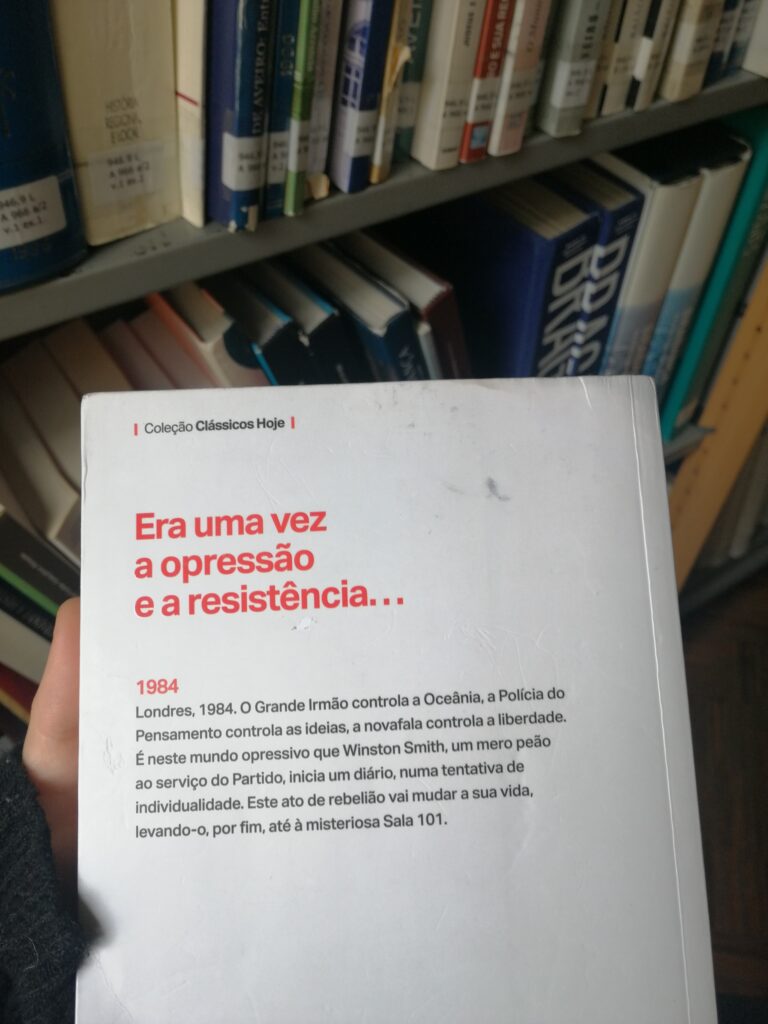
Well, moving on, through this book we do not only see the representation of extreme forces of political power, oligarchy, fascism and communism, but we also see how it could turn out. Not only is the society completely brained washed since they are little, being obligated to undermine memories and swallow everything that is fed into they’re mouth. Not only this, but through the book we see that people lose a very important thing in this way of thinking: individuality. In any way they have it, not in their work, that implies little thinking; not in their style, they have to wear all the same jumpsuit; not on the things they do outside of work, the only things they can do is activities that benefit the Party; and most importantly, not on their thoughts, since they have to have the same thoughts as the neighbor next door.
I think this sense of individuality is what makes Winston like the “proles” so much. In his point of view, they don’t have worries, they can have the life they want (with the respective restrictions of course), they don’t know anything about what’s going on behind the scenes and yet they are able to live happy lives. This is what Winston would have liked to live and this is marked by his memories of his childhood with his mom in a simple house.
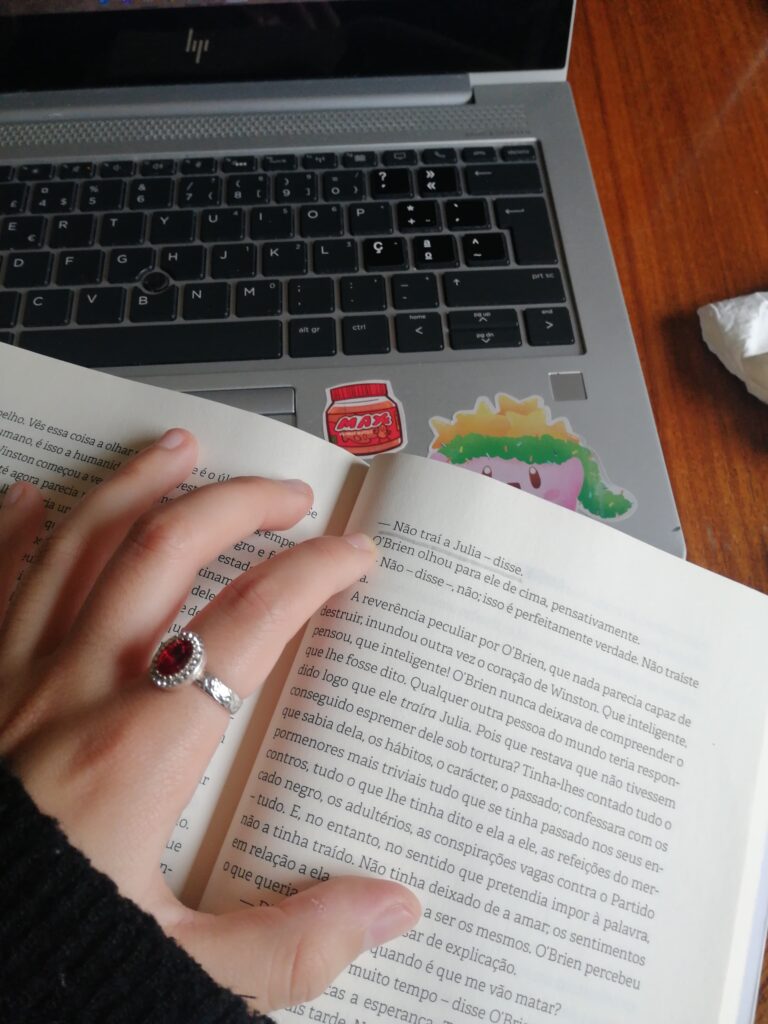
Conclusion
In conclusion, I really enjoyed and pained through 1984. I think it was one of the smartest reads I’ve had in a while (I know I’m 19). This book is able to tackle and attack all of the extreme political views and its criticism still stands today.
Let’s just stop and think of the world scenario for a bit: ongoing wars, poverty, oppression systems and corrupt governments that the general public is blinded to, countries trying to control one and other, the mass fake information being spreaded across social media (including, news, AI photos and deepfakes not disclaimed as such) and the overall mass Internet consumption and the rise of AI (that can take some things away, such as: individualism, literacy, refection time, confidence, and many others).
With the last being threats that we, as the general public can more or less control or at least be aware.
I truly hope more people read this book and connect the dots so we can actually wake up and fight back, not with extremism but with sense, humanity and the most important, peace.
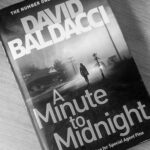

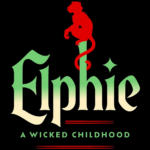
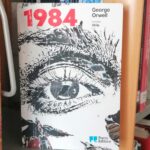



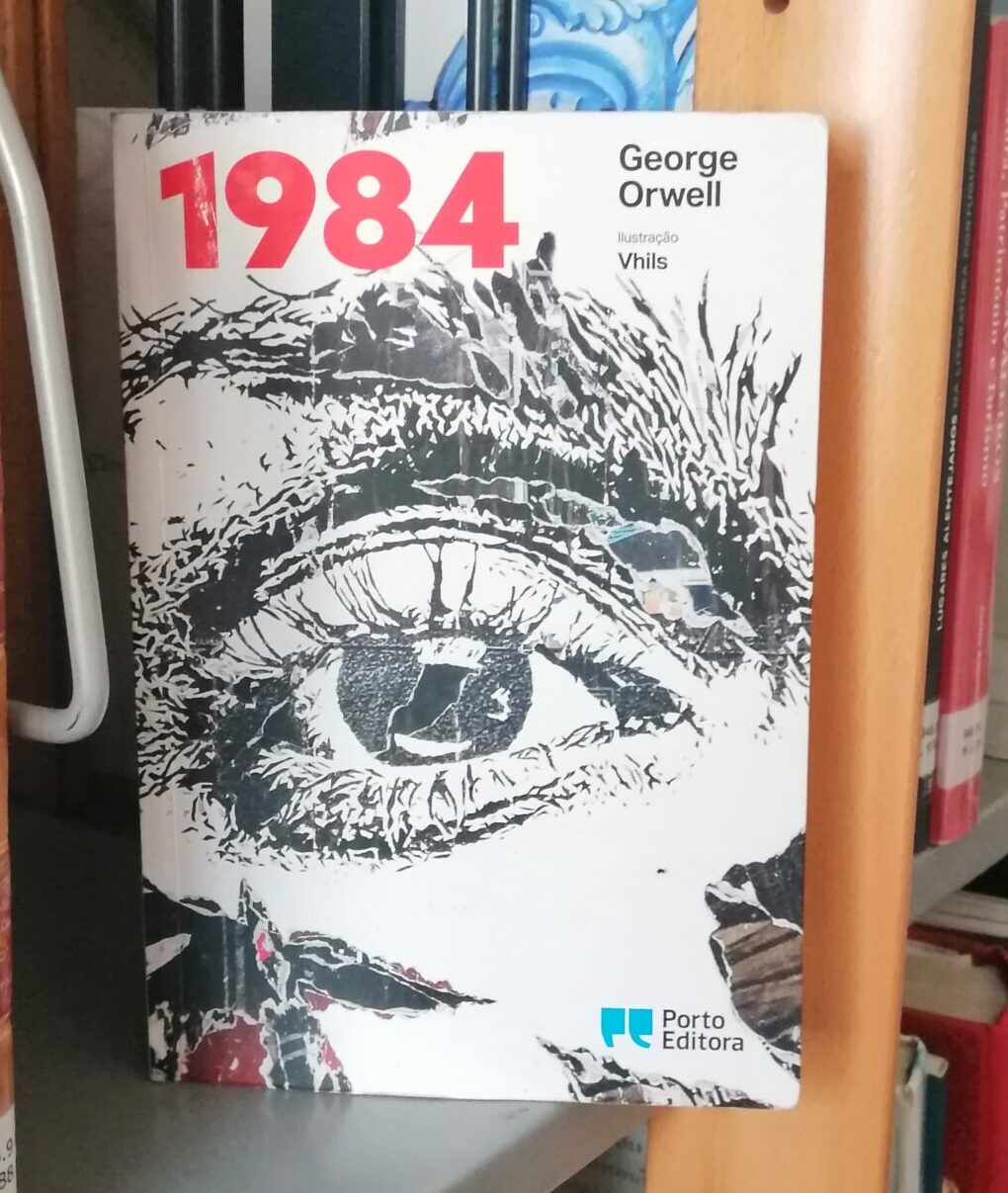
Love it 👏👏
Thank you for the feedback, we appreciate it 🙂
I really appreciated your point of view! Please do a review of the same book but on the perspective of Julia <3
Once that book fall’s into my hands it’s the first thing I’ll do when I finish it!!
Keep going with the good work! Loved how you have expressed your opinion
Thank you so much for the feedback 🙂
an amazing review of a great book!
George really putted out how the world engine works, and how the less afortunated keep receiving strike after strike not even considering how they can achieve their goals.
Yes, and it’s so sad that some of the realities of the book are still comparable to today’s society…
Love the article!
Thank you 🙂
Really nice review, I’m planning on reading this incredible book!
Thank you, feel free to comment your takes once you’ve read it 🙂
Love the article! Are you thinking of reading 1984’s Julia version?
Yes I am! I am most curious about Sandra Newman’s take on the character and know a bit more about her 🙂
Loved the article!!
When are your next reviews coming?
Very soon…
I’m definitely reading it now! Thank you, keep up the good work 🙂
Thank you very much. Hope you enjoy the book as much as I did 🙂
mhmmm acho que vou reler o 1984 em vez de estudar para ciência política. o exame é hoje, mas dá igual
What do you think of the audiobook with andriew garfield?